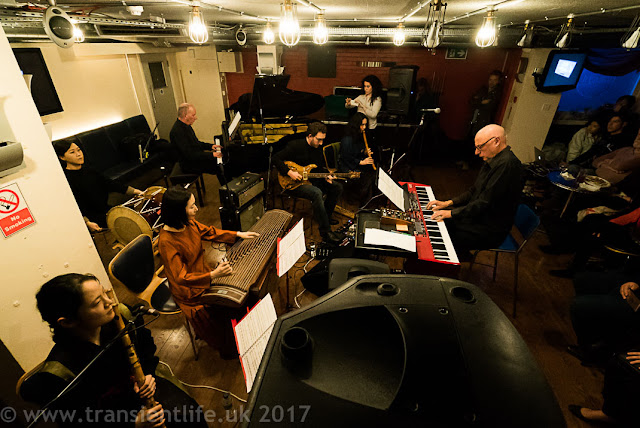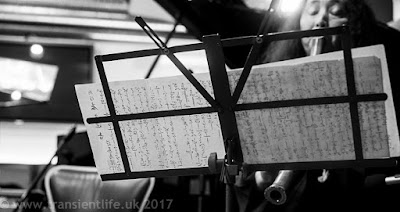 |
| Yi Ji-Young (gayageum), Hyelim Kim (taegum), Jihye Kim (chango), Kiku Day (shakuhachi), Notes Inégales, Peter Wiegold at Club Inégales |
Reviewed by Robert Hugill on Apr 18 2017
Star rating:
An absorbing club-night combining both Western, Korean and Japanese traditions
What do you get when you combine three Korean instruments (changgo, gayagum & taegum), a Japanese instrument (shakuhachi), a piano, an electric guitar and a synthesizer? That was the question being asked by Tuesday's (18 April 2017) event, Presence through sound, at Club Inégales, the music venue in North Gower street devoted to music in all its guises, directed by composer Peter Wiegold.
 |
| Kiku Day (shakuhachi) at Club Inégales |
Club Inégales is a basement club in North Gower Street, situated below a firm of solicitors (whose support for the club is invaluable), and the club runs regular events where guest musicians from a wide variety of cultures and styles join with the resident band. Tuesday night was busy, with 60 or so audience members filling the club. It has a nicely casual atmosphere, and audience members are able to buy drinks and Indian food before the music starts.
There were a number of links between Tuesday's performers with SOAS being an essential supporting factor. The event was produced in association with SOAS and Peter Wiegold had in fact been an examiner on both Kiku Day and Hyelim Kim's Ph.D.'s. And, though Hyelim Kim was guest on Tuesday, she does in fact play regularly as a member of Notes Inégales,
On Tuesday we started with a short improvisation from Peter Wiegold, Martin Butler and Joel Bell, which seemed to use late-night jazz-inspired riffs but combined them in intriguing ways, creating something rather evanescent which coalesced gradually into a more structured yet affectingly fluid piece. This was followed by a short solo from each of the guest musicians.
Kiku Day played the shakuhachi, a traditional Japanese bamboo flute (played upright) with five holes. She started with an improvisation which used a great deal of breath with only hints of pitch, but creating something fast and vibrant. This led directly into an excerpt from a traditional Japanese piece, again with a striking combination of pitch and breathy tone. The instrument seemed to have an intriguing number of possible variables available to the player, and Day created a very melancholy mood, evocative of Japan.
 |
| Hyelim Kim (taegun) at Club Inégales |
Hyelim Kim played the taegun, a Korean bamboo flute. This is played transverse and has a large embouchure and six finger holes, along with an extra hole covered by a membrane so that when the player over-blows it creates a buzzing sound. Indeed Heylim Kim was able to produce a remarkable range of sounds, She played a late-night piece of Korean court music, very evocative and very strong in timbre because of the extra buzzing sound, yet with a translucent quality too.
Finally, Jihye Kim performed on the Korean changgo, along with a gong. She started with some formal, ritual elements on the gong before moving to the drum-like changgo (at one point rather impressively playing both). Considering she was only using two hands she managed to create a remarkable web of complex drumming sounds which culminated in a spectacularly fast section.
After a short interval all the musicians came together to play a group of pieces. Peter Wiegold had written three new piece, Changgo changgo One, Two, and Three, but he emphasised that these were only skeletons around which the players could build the music. The first was multilayered over a rhythmic sort of ground, interweaving timbres and textures which different instruments coming to the fore. The second started with drum rhythm and guitar before layering other instruments over to create something busy, yet never loud, and full of subtle textures. The third was closer to cool jazz, with a lot of breath and texture over a basic rhythm.
Next came a piece, Imortality, which Wiegold originally wrote for the club when the guests were a group of Indian musicians and which is based on a verse by Rabindranath Tagore ('let the dead have the immortality of fame, but the living have the immortality of love', from Stray Birds, Tagore's own translations from his original Bengali ). A mesmerising and thoughtful piece. Rif One had originally been written by Wiegold for the National Youth Folk Ensemble, again multiple layers over repeating rhythmic figure creating something complex and entrancing.
The group finished with an improvisation, an invigorating piece which showcased the remarkable interaction between musicians of different traditions. As Peter Wiegold said at the beginning of the evening, 'music is one'
Elsewhere on this blog:
- Important and involving: Kenneth Leighton complete organ works on Resonus Classics - CD review
- Wonderful birthday present: First recording of John Joubert's Jane Eyre on SOMM - CD review
- Beautifully fluid: Durufle Requiem from St John's Smith Square's Holy Week Festival - concert review
- A window on a 16th century Italian convent: Lucrezia Borgia's daughter from Musica Secreta and Celestial Sirens - CD review
- Tallis discoveries: David Skinner and Alamire at St John's Smith Square - concert review
- From the Baldwin part books: Virgin and Child from Owen Rees and Contrapunctus - CD review
- Engagement with the word: Chapel Choir of the Royal Hospital Chelsea, in Handel's Messiah - concert review
- Bach re-invented: The Little Baroque Company in Bach's Coffee Cantata at the London Handel Festival - concert review
- Moving and inspiring: Dmitri Tcherniakov's production of Wagner's Parsifal at Berlin Staatsoper's Festtage - opera review
- Thoughtful: Bach's St Matthew Passion with Ian Bostridge - concert review
- Home

.jpg)









No comments:
Post a Comment